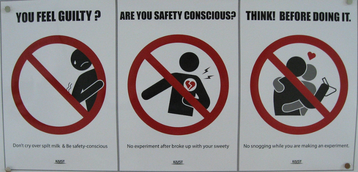 Image: D Squared
Image: D Squared What jargon, sex jargon? Was Professor Wellings using slang? Sex slang, Kate? Did she say muff or 'down there' or giggle? No. But when discussing the research questions and answers used to collate the results published in the thirdNational Survey of Sexual Attitudes and Lifestyle in The Lancet rather than use the word 'rape' Wellings and the survey used the term "sex against their will."
When Humphrys mildly pressed about this choice of words which sound an awful lot like the definition of rape, Professor Wellings with these spluttered words: 2those who have had sex against their will, I, can we call it rape I mean that, that, that's..." Wellings explained "Well we don't call it rape because we ask women and men to define the experience, we say: 'have you had sex against your will?'"
| Which does not suggest those men and women questioned have defined their experience at all. In fact it rather sounds like they have had their experience dialled down. No, that wasn't rape, that was sex against your will. Wellings continued: "As long as they think they had sex against their will, that's what counts." | Think of that sexual encounter you had in the same terms as that time you bought the half price packet hair dye and your hair went an unsavoury colour. |
"But they don't report it?" Humphrys asked, "Roughly half do" was the alarming reply. And is it any wonder that only roughly 1 in 5 women have the confidence to report their 'sex against their will.' It sounds like you're going to the police to inform them you had a headache and did it without painkillers because your partner wouldn't take the hint.
It's up there with 'regretful sex.' You weren't raped, you got drunk. Think of that sexual encounter you had in the same terms as that time you bought the half price packet hair dye and your hair went an unsavoury colour.
Language. It can make the difference between a Panda getting involved in a shooting and a rape survivor reporting their attack. Wendy Macdowall, of the London School of Hygiene and Tropical Medicine, the lead Natsal author, suggested schools needed to discuss the subject of sexual coercion, because it appears it has become "normalised...with rape at the extreme end of the spectrum."
I think this shows rape - while an extreme crime, is not at the end of the spectrum. It is increasingly being treated as something that can be divided by degrees. With, as Whoopi Goldberg might say, 'rape rape' at the end of the rape spectrum. We can talk about coercion and consent until we are blue in the face but none of it will matter if we can't call rape, rape.
Squeamish Kate


 RSS Feed
RSS Feed
